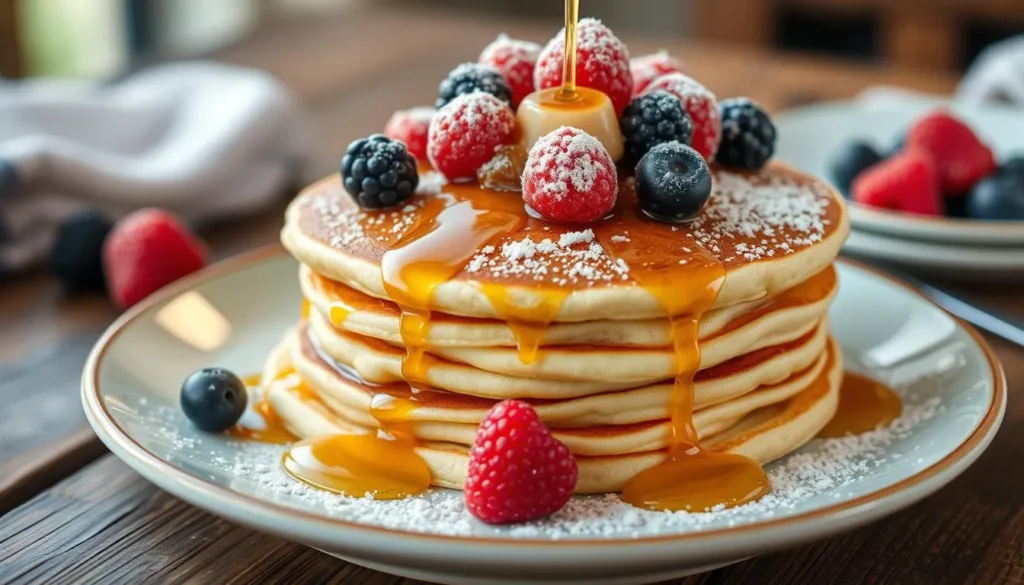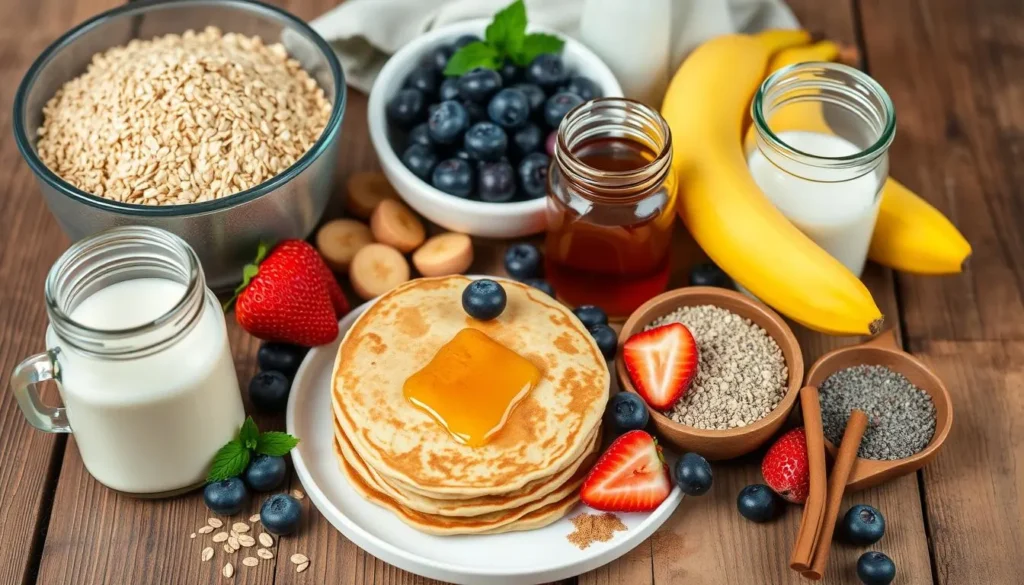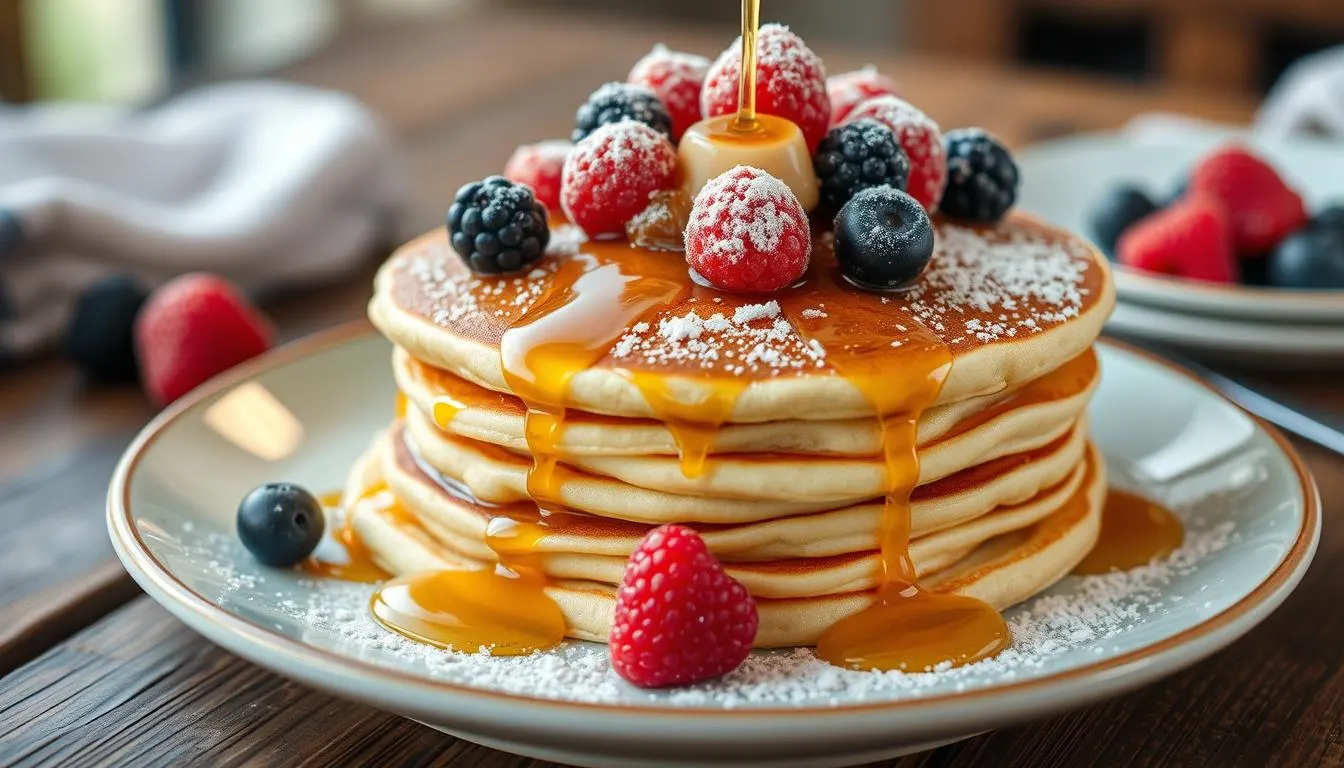The smell of butter and warm batter fills the air, making us crave fluffy pancakes. But do homemade pancakes really fit into a healthy diet? We’ll look into their nutritional value and how they can be part of a balanced diet.
Pancakes were a big deal in my family on weekends. We’d all gather to enjoy our homemade pancakes. The memories of my mom’s flipping and the crunchy edges are still vivid. But as I got older, I started thinking about healthier choices. I wondered if pancakes were really good for me.

Key Takeaways
- Homemade pancakes can be a nutritious part of a balanced diet when made with the right ingredients.
- The nutritional value of pancakes depends on the recipe used, with homemade options generally being healthier than store-bought mixes.
- Pancakes provide a source of carbohydrates for energy, as well as important vitamins and minerals.
- Incorporating whole grains, lean proteins, and healthy toppings can enhance the overall nutritional profile of homemade pancakes.
- Portion control and moderation are key to enjoying pancakes as part of a healthy lifestyle.
Understanding the Health Value of Homemade Pancakes
Choosing the right ingredients is key to making healthy pancakes. Knowing what’s in your pancake mix can help you make better choices. This way, you can enjoy a nutritious breakfast.
Basic Pancake Ingredients and Their Nutritional Value
Most pancake mixes have flour, milk, eggs, and baking powder or baking soda. Each ingredient adds something special to your pancakes:
- Flour – It can be all-purpose, whole wheat, or gluten-free. Each type has different carbs, fiber, and nutrients.
- Milk – It’s full of protein, calcium, and vitamin D. Non-dairy milks like almond or oat milk have their own set of nutrients.
- Eggs – Eggs are packed with protein and vitamins like B12, selenium, and choline.
- Leavening agents – They make pancakes light and fluffy. But they don’t add much to the nutritional value.
Store-Bought vs. Homemade Comparison
Homemade pancakes are healthier than store-bought mixes. Store-bought mixes often have added sugars and preservatives. Homemade pancakes let you choose better ingredients for a healthier breakfast.
| Nutrient | Store-Bought Pancake Mix | Homemade Pancakes |
|---|---|---|
| Calories | 150 per serving | 120 per serving |
| Total Fat | 4g | 3g |
| Sodium | 320mg | 240mg |
| Carbohydrates | 25g | 20g |
| Fiber | 1g | 2g |
| Protein | 4g | 5g |
Choosing homemade pancakes means a healthier breakfast. It fits your dietary needs and tastes better.
Is Homemade Pancakes Healthy? Breaking Down the Facts
Homemade pancakes are not just one thing. They can be healthy, but it depends on the ingredients. Knowing what goes into your batter is key to making better choices.
One big plus of making pancakes at home is controlling what you put in them. Using whole grains, fresh fruits, and healthy fats makes them more nutritious. But, remember, even homemade pancakes should be part of a balanced diet.
Many people think pancakes are unhealthy. But, homemade ones made with good ingredients can be a better choice. It’s all about eating the right amount and choosing the right ingredients.

The healthiness of homemade pancakes really depends on the ingredients and your diet. By choosing the right ingredients and controlling portions, you can enjoy pancakes while staying healthy.
Essential Nutrients Found in Traditional Pancake Recipes
Homemade pancakes are more than just a tasty breakfast. They are also packed with nutrients that boost your health. Knowing what’s in traditional pancake recipes helps you add them to your diet wisely.
Carbohydrates and Energy Benefits
Pancake batter is full of carbohydrates, which give us energy. The pancake nutrition in homemade recipes includes complex carbs. These carbs release energy slowly, helping you stay active and focused all day.
Protein Content in Basic Pancake Batter
While pancakes have more carbs than protein, they still offer a good amount. Eggs, milk, and some flours add protein. Eating protein-rich foods like pancakes helps build muscles and repair tissues.
Vitamins and Minerals Present
Pancake recipes often contain essential vitamins and minerals that contribute to your overall health. Depending on the ingredients used, pancakes can provide B vitamins, which are important for energy production, as well as calcium and iron, which support strong bones and healthy blood.
Gaining a better understanding of the nutritional content and key nutrients found in traditional pancake recipes is essential for making healthier choices. By learning about their benefits and how to optimize ingredients, you can enjoy pancakes without compromising your dietary goals. With this approach, pancakes can easily become a delicious and satisfying part of a well-balanced diet.
Making Your Pancakes More Nutritious: Smart Ingredient Swaps
Making pancakes at home can be a fun and healthy breakfast choice. You can make them even better by changing a few ingredients. These swaps can make your pancakes more wholesome and filling.
Try using whole wheat flour instead of all-purpose flour. This adds more fiber and complex carbs to your pancakes. Greek yogurt is another great swap for milk or buttermilk. It makes your pancakes creamy and boosts the protein.
For a lower-fat option, use unsweetened applesauce or mashed bananas instead of butter or oil. These add natural sweetness and moisture without extra calories or fat.
Almond milk is a great choice for low-fat pancake recipes. It’s low in calories, has healthy fats, and tastes nutty. It’s a perfect substitute for cow’s milk in pancake batter.
| Ingredient | Traditional Pancake | Healthier Swap | Nutritional Impact |
|---|---|---|---|
| Flour | All-purpose flour | Whole wheat flour | Increased fiber, complex carbohydrates |
| Milk | Cow’s milk | Almond milk | Reduced calories, added healthy fats |
| Dairy | Butter, buttermilk | Greek yogurt | Higher protein, lower saturated fat |
| Fat | Butter, oil | Applesauce, mashed banana | Reduced calories, less saturated fat |
By swapping a few ingredients, you can make your pancakes healthier and tastier. Try these swaps and see how easy it is to make healthy breakfast pancakes without losing flavor.
Whole Grain Pancakes: A Healthier Alternative
Switching to whole grain pancakes can greatly improve your breakfast. These pancakes, made with whole wheat flour, are packed with nutrients. They offer health benefits that make your morning meal even better.
Benefits of Using Whole Wheat Flour
Whole wheat flour is a nutritional powerhouse. It includes the germ and bran, which are rich in nutrients. Compared to white flour, it has more fiber, protein, and vitamins and minerals. This makes it a great choice for pancakes, helping you feel full and supporting your health.
Fiber Content and Digestive Health
Whole grain pancakes are high in fiber. Fiber is key for a healthy digestive system. It helps with bowel movements and supports the gut microbiome. Adding whole wheat flour to your pancakes can nourish your body and improve digestion.
| Nutrient | Whole Wheat Flour | Refined White Flour |
|---|---|---|
| Fiber (per 100g) | 12.2g | 2.7g |
| Protein (per 100g) | 13.2g | 10.3g |
| B Vitamins (per 100g) | Significantly higher | Lower due to processing |
Choosing whole grain pancakes for breakfast boosts your health. Enjoy the benefits of whole grain pancakes and start your day with a nutritious meal.
Protein-Rich Pancake Variations for Balanced Nutrition
Pancakes are a favorite breakfast dish, but you can make them healthier. Adding protein-rich ingredients to your batter makes them more nutritious. This way, you get a meal that keeps you full and energized all day.
Adding Greek yogurt or cottage cheese to your batter is a great idea. They add protein, a creamy texture, and a tangy taste. You can also try adding protein powder to your protein-rich pancake batters.
- Greek yogurt or cottage cheese: Adds a creamy texture and tangy flavor while boosting protein.
- Protein powder: Easily blended into the batter for an extra protein punch.
- Nut butters: Peanut, almond, or cashew butter can be stirred into the batter for a nutty, protein-rich treat.
Protein-rich pancake batters offer more than just filling food. Protein helps build and repair muscles. It also helps you feel full, which can help with weight management. By adding these protein-packed ingredients to your healthy breakfast ideas, you start your day off right.
“Pancakes don’t have to be just a carb-heavy indulgence. With a few simple tweaks, you can turn them into a balanced, protein-packed meal that will fuel your day.”
Impact of Toppings and Add-ins on Nutritional Value
The toppings and add-ins you choose for pancakes can greatly affect their nutritional value. Traditional syrups and high-sugar condiments may taste great but add too many calories. They also increase the meal’s glycemic load. To make pancakes a healthy breakfast choice, try healthier toppings that boost nutrition without losing flavor.
Healthy Topping Alternatives
Instead of sugary syrups, try these nutritious toppings for your pancakes with fruit toppings:
- Fresh berries, such as blueberries, raspberries, or strawberries, which are packed with antioxidants, fiber, and natural sweetness.
- Sliced bananas or other fresh fruit, which provide essential vitamins, minerals, and complex carbohydrates.
- A drizzle of honey or pure maple syrup, offering a touch of natural sweetness with some additional nutrients.
- A sprinkle of chopped nuts or seeds, like almonds or chia seeds, to add healthy fats, protein, and crunch.
- A dollop of plain Greek yogurt or cottage cheese, which can enhance the protein content of your healthy breakfast ideas.
These nutrient-dense toppings can make your pancakes a healthier, more balanced meal.
Fresh Fruit and Natural Sweeteners
Using fresh fruit and natural sweeteners can greatly improve your pancakes’ nutritional value. Ripe, juicy berries or sliced bananas add vibrant color and flavor. They also bring valuable vitamins, minerals, and fiber. These toppings can help you feel fuller and more satisfied, supporting your healthy breakfast ideas.
| Topping | Nutritional Benefits |
|---|---|
| Blueberries | Rich in antioxidants, fiber, and vitamins C and K |
| Bananas | High in potassium, fiber, and natural sweetness |
| Honey | Contains antioxidants and provides a natural sweetener |
| Maple Syrup | Offers minerals like zinc and manganese, as well as a lower glycemic index than refined sugar |
Choosing pancakes with fruit toppings and natural sweeteners can make your pancakes a nutritious and satisfying breakfast.
Special Dietary Considerations: Gluten-Free and Vegan Options
In the world of pancakes, catering to diverse dietary needs is crucial. Whether you’re seeking gluten-free pancake options or exploring vegan pancake alternatives, there are plenty of delicious and nutritious choices available.
For those following a gluten-free lifestyle, the key is to swap out traditional wheat flour with alternative options like almond flour, coconut flour, or gluten-free all-purpose blends. These flour substitutes not only provide the same fluffy texture but also offer additional health benefits, such as higher fiber and protein content.
Vegan pancake enthusiasts can also indulge in these breakfast favorites by using plant-based milk and egg replacers. Ingredients like mashed ripe banana, applesauce, or ground flax or chia seeds can seamlessly replace eggs, while non-dairy milks like almond, soy, or oat milk can stand in for their dairy counterparts.
“Embracing specialized dietary pancake options allows everyone to enjoy this beloved breakfast treat, regardless of their food preferences or restrictions.”
The nutritional profiles of these specialized pancake variations can be quite impressive. Gluten-free and vegan pancakes often boast higher fiber, antioxidants, and essential vitamins and minerals compared to their traditional counterparts. By carefully selecting the right ingredients, you can create a pancake that is both delicious and nutritionally balanced.
Whether you’re catering to personal dietary needs or simply exploring new and innovative pancake recipes, the world of gluten-free and vegan pancakes offers a wealth of flavorful and nutritious options. With a little creativity and the right substitutions, you can enjoy fluffy, satisfying pancakes that cater to your unique dietary preferences.
Balanced Breakfast: Pairing Pancakes with Nutritious Sides
Creating a wholesome breakfast is more than just pancakes. Pairing your homemade, nutrient-dense pancakes with the right side dishes makes your morning meal better. It gives you a balanced mix of nutrients.
Try adding a fresh fruit salad to your pancakes. Apples, berries, and melon add color and sweetness. They also bring vitamins, minerals, and fiber for a healthy breakfast ideas.
Yogurt parfaits are another great choice. Layer pancakes with Greek yogurt, granola, and berries. This mix of protein and fiber keeps you full and energized.
For a savory touch, add scrambled eggs or a veggie-packed omelet. This mix of carbs, protein, and fats boosts your nutrition at the start of the day.
Choosing the right sides for your pancakes makes for a balanced breakfast. It feeds your body and pleases your taste buds. Try different sides to find your favorite morning meal.
“Pairing your pancakes with nutrient-dense sides is the key to a truly satisfying and well-rounded breakfast.”
Portion Control and Moderation: Keys to Enjoying Pancakes Healthily
Enjoying homemade pancakes can be healthy if you control your portions and eat them in moderation. Pancakes can be tasty and filling, but eating too much can harm your health. So, is homemade pancakes healthy? It depends on how much you eat.
It’s key to know the right serving size for pancakes. Experts say to have just one 4-inch pancake or half a cup of batter. Eating more can lead to too many calories, carbs, and fats. By controlling your portions, you can enjoy pancakes without ruining your diet.
It’s also important to not eat pancakes too often. They can be a tasty breakfast, but they should be part of a balanced diet. Try to have pancakes as a special treat or as part of a complete meal plan. This way, you keep a healthy relationship with food and avoid eating too much.
- Stick to a single 4-inch pancake or a half-cup of batter per serving
- Enjoy pancakes as an occasional treat or as part of a balanced meal plan
- Be mindful of your intake and avoid overconsumption
By following these tips, you can enjoy homemade pancakes while staying healthy. The secret is to find a balance and eat them as part of a nutritious lifestyle.
Conclusion: Embracing Homemade Pancakes as Part of a Balanced Diet
In this article, we’ve looked at why homemade pancakes are better than store-bought ones. We’ve covered the nutritional value of basic ingredients and how to make healthier pancakes. Now, you know how to add this breakfast favorite to your balanced diet.
Homemade pancakes can be a tasty and healthy breakfast ideas if you use the right ingredients. By choosing whole-grain flours and adding protein, you can enjoy pancakes while staying healthy.
Keep exploring healthier eating by trying different homemade pancakes healthy recipes and toppings. Feel free to make your pancakes your own, adding to your culinary adventures. This way, you nourish your body and soul.
Related : Easy Homemade Hotcake Mix Recipe | Perfect Breakfast
FAQ
Are homemade pancakes healthy?
Homemade pancakes can be a healthy choice when prepared thoughtfully. The key lies in selecting the right ingredients, such as whole-grain or alternative flours, limiting added sugar, and opting for nutrient-rich toppings like fresh fruits or nuts. By making these mindful choices, you can transform traditional pancakes into a more wholesome and balanced option.
What is the nutritional value of pancakes?
Pancakes give you energy from carbs. They can also have protein, vitamins, and minerals. Homemade pancakes are often better than store-bought ones.
How can I make my pancakes more nutritious?
To boost the nutritional value of your pancakes, start by using whole-grain flours, which provide more fiber and nutrients compared to refined flours. Additionally, reduce the amount of sugar in the batter to cut down on empty calories. For an extra protein punch, incorporate ingredients like Greek yogurt or cottage cheese. Finally, top your pancakes with fresh fruit instead of sugary syrups for a healthier and naturally sweet option.
What are the benefits of whole-grain pancakes?
Whole-grain pancakes offer numerous health benefits. They are rich in fiber, which supports digestion, and contain more essential nutrients than pancakes made with refined flour. These qualities make whole-grain pancakes a better choice for sustained energy and overall health.
Can I make protein-rich pancakes?
Absolutely! To make protein-rich pancakes, try adding Greek yogurt, cottage cheese, or a scoop of protein powder to your batter. These ingredients not only enhance the nutritional profile but also help keep you feeling full longer while supporting muscle health and recovery.
How do toppings and add-ins affect the nutritional value of pancakes?
The choice of toppings and add-ins has a significant impact on the nutritional value of your pancakes. Opt for fresh fruits, nuts, or natural sweeteners like honey or maple syrup to add vitamins, minerals, and healthy fats. Conversely, avoid high-sugar syrups, whipped cream, or candy-like toppings, as these can drastically increase sugar and calorie content without adding much nutritional value.
Are there gluten-free and vegan pancake options?
Yes, there are many options for those with dietary restrictions. For gluten-free pancakes, substitute regular flour with almond, oat, or rice flour. If you’re looking for vegan alternatives, use egg replacers like flaxseed meal or mashed bananas, and opt for plant-based milk such as almond or oat milk. These substitutions allow everyone to enjoy pancakes while adhering to their dietary needs.
How can I enjoy pancakes as part of a balanced diet?
To include pancakes in a balanced diet, enjoy them in moderation and focus on nutrient-rich ingredients. Pair your pancakes with other healthy foods, such as fresh fruit or a side of scrambled eggs, to create a well-rounded meal. By making mindful ingredient choices and balancing your portions, pancakes can easily become a delicious and health-conscious addition to your diet.

